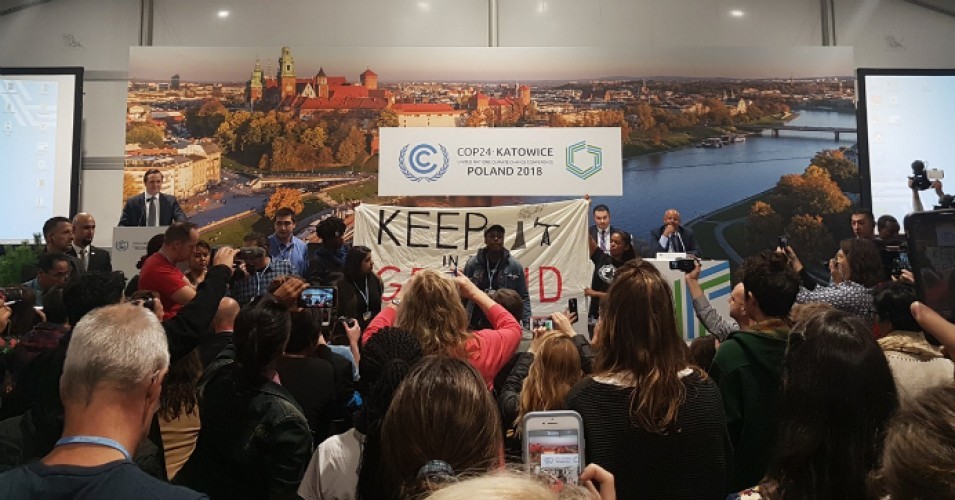COP24 – A frustrating end to climate talks in Katowice, Poland – Or is it?

With the climate talks at COP24 in Katowice, Poland ending, the overall vibe regarding outcomes is grim, as described in a good overview by James Ellsmoor in Forbes. Staying positive and optimistic is challenging, but we have no choice and need to continue the fight.
Last week, I attended a side event during the COP24 meetings in Katowice, Poland. This was my second COP event I attended, after the first experience in Bonn, Germany last year.
I was glad meeting several folks I knew, including James Ellsmoor of Solar Head of State, who has worked tirelessly on renewable energy implementation in the context of island states. Having been at the event in Katowice last and this week, he published a rather frustrated piece on Forbes following the events “Ten Things The World Learned At The COP24 Climate Change Negotiations”.
His observations and take from the events are frustrating to read, but resonate with the overall vibe we have received over the general media. The sad part though seems to be that the magnitude of discussions and the attitude of some of the nations attending is not being portrayed as seriously as they are.
Holding the climate talks in Poland’s coal country in Katowice should have been an eye-opener for anyone attending. Landing in Poland on a cold wintery evening, the air filled with smoke from coal-fired heating was a gruelling reminder of what the world faces. How health effects from air pollution is not more part of a political debate and accountably addressed by politicians is stunning. Here is an interesting overview on air pollution in Europe just at the beginning of the talks.
In his article, James shares some personal key take aways. One that he describes very vividly is the Katowice booth at the event – essentially a (perceived) shrine for coal. In a rather bizarre approach, the U.S. administration even held a pro-coal side event at COP24 … with Australia, the only country beside the U.S. represented.
So while the U.S., Saudi Arabia, Russia and Kuwait made headlines in a hair-splitting approach to the key scientific report on global warming made the headlines, countries such as Australia “reaffirming its commitment to coal” or Poland with the coal shrine at the event show that short-term political thinking remains a powerful force … how to change this remains the key challenge. How can we make politicians understand that there is room for short-term thinking in politics, but there is and should not for things effecting the future of our planet for our children and their children in the not too distant future.
Here an interview with James on the topic of the report and actions by the U.S., Russia etc.
It should be time to better highlight individual countries’ roles in climate change and actions to work on carbon reductions.
I share similar frustrations as James, even without all the insights he shared in his article.
At the same time, we might want to consider not wasting time to deal with the bullies of this world, but rather strengthen our efforts with the positive forces of this world. Cutting out the noise from the nay-sayers, we are faced with an extremely energised renewable energy sector, and powerful advocates for mitigating climate change.
My take from events like the one in Katowice are 1. We need to figure out a way to bundle funding and efforts, rather than push thousands of efforts by individual countries to push their agendas (often focused on national economic development and publicity) and 2. Finding a way to move from the numberless “preaching to the choir”- events to concrete project driven events that push development of energy transition as widely as we can.
Let’s stop competing as individual renewable/ clean energy technology industries and further strengthen our cooperation to force the hand of countries (administrations) such as the U.S. that so blatantly neglect the realities of climate change and the wide-reaching impacts they have. A good overview actually is the “Climate Change Performance Index 2019” (pdf).
We also need to make countries accountable, so while the U.S., Saudi Arabia, Russia and the likes make headlines, the take of Australia or Brasil with their political leadership’s approach to climate change are likely even more dangerous.
So if the meetings and the outcomes, or lack thereof, at COP24 are frustrating, the positive thing is that this brings the rest of the world even closer together. The increasing force of large corporations in pushing energy transition and sustainability issues is also an important and probably underestimated piece of the overall puzzle. Let’s keep up the fight and even increase it, we owe it to our children.
Source and reference: James Ellsmoor via Forbes